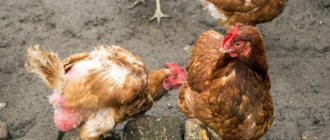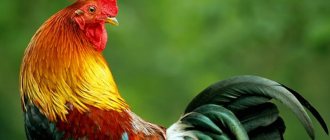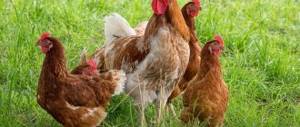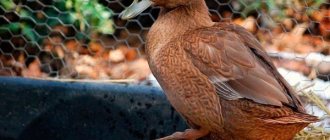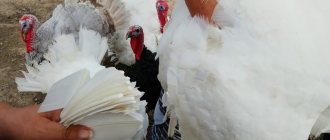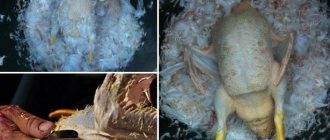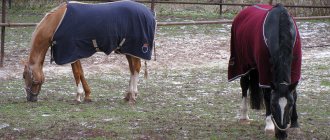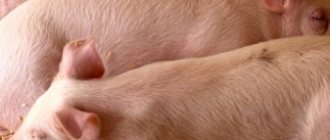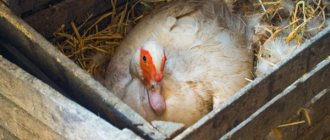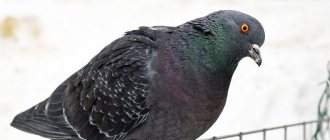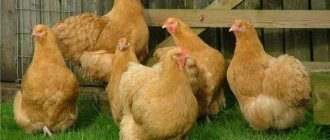As a child, at the dacha, I always watched with interest how chickens grew. My grandmother raised chickens and there were almost always chickens. According to my observations, there is no clear age when a rooster begins to crow. They definitely won’t crow until they are two months old, they are too small, at this age they still squeak, but they don’t get a full-fledged crow. At about 2.5 months, rare young cockerels attempt to crow (it looks funny). But a three-month-old rooster crowing is not uncommon.
The vast majority of roosters have a prime time of 4-5 months; it is at this age that they begin to crow. Moreover, as a rule, as soon as they learn, they crow every half hour. But it goes away quickly.
By the age of six months, all roosters crow.
Not all poultry farmers want to breed chickens using the incubation method. With the natural method of breeding, as well as with the incubation method, fertilization is necessary for the appearance of chicks. Therefore, a farm cannot do without a male.
Fertilization
Chickens, like most other birds, have love etiquette and rules of behavior in the flock. The rooster is the leader to whom the hens obey unquestioningly. The leader may have his own favorites with whom he shares food.
- When flirting, the male sedately walks around the hen and scratches his wing with his paw.
- The mating process begins with the rooster climbing onto the hen and moving his paws over it, trying to find the recess provided by nature on the back, “tramping” the hen.
- The beak grabs her head and mating begins: a brief contact of the partners' cloaches. At this moment, the seminal fluid penetrates the oviduct and fertilization of the egg occurs.
- During mating, while the rooster holds the hen's head with his beak, the organisms of both birds are preparing for fertilization. During the process of trampling, the cloaca of the partners is slightly turned out. In males, the gonads are located on the inside of the cloaca, near the outlet.
- The seminal fluid remains in the laying hen's body for up to 20 days. During this entire period of time, fertilization of the eggs occurs. It penetrates through their soft shell, not yet covered with a shell. Whether there is an embryo in the egg is determined using an ovoscope. This is a device designed to illuminate the shell.
The sexual activity of roosters varies. Some males are capable of 20 matings per day. In order to properly plan housekeeping, you need to know at what age a rooster begins to trample hens.
Males begin to be active in this matter only after they crow. That is, not earlier than 5-6 months.
Sexual function is affected by:
- The presence of adult and aggressive rivals;
- Features of the breed;
- Quality and sufficiency of feed;
- Conditions of detention.
Reproductive capacity decreases or is completely lost during molting. More often this happens in the fall, but there is no exact time frame.
Can a hen lay eggs without a rooster?
The chicken’s body functions in such a way that in order for eggs to appear, it only needs to reach maturity. It can occur between 5 and 8 months of age, depending on the breed. Immediately after reaching sexual maturity, the chicken lays eggs.
Their size, shell color, and frequency of appearance depend on several factors:
In order to lay an egg, a chicken needs no more than 2 days.
The formation process occurs as follows:
- The egg matures in the ovary;
- It leaves the follicle and enters the oviduct;
- The formation of the egg begins in it: the yolk, white and shell appear;
- Upon completion of the process, the egg begins to move towards the exit outside.
In order for the process of laying eggs to occur regularly, the hen does not need a rooster. Her body itself performs the tasks assigned by nature.
The male is necessary for the fertilization process, after which the embryo, the future chicken, begins to develop in the egg.
Why are fertilized eggs better than unfertilized ones?
In terms of taste, external and other qualities, a fertilized egg is no different from an unfertilized one. Both types of products are suitable for nutrition and it is impossible to distinguish one from the other.
But there are many myths about the characteristics of fertilized eggs, claiming their special magical, energetic and nutritional value. All these speculations have been debunked by facts - conducted scientific research. The results prove that the energy and nutritional value of both types of eggs is the same.
It is impossible to produce offspring from an unfertilized one. Neither by incubation, nor from under the hen. All attempts to go against nature will be unsuccessful. It is for the reason of obtaining offspring that a rooster is needed on the farm. On average, one male is enough for 10-12 chickens.
Sometimes farmers have a question: why don’t roosters trample chickens? This depends on many reasons, but primarily on age. For an aging “chicken coop owner,” it is recommended to have an assistant—a younger male.
It is not recommended to keep a significant number of males in the herd, higher than recommended. This will lead to fights between them.
Why do roosters crow?
To the question of why roosters crow, one can give a clear answer: for these birds, crowing is a way of communication and roll call. Moreover, there is a certain hierarchy among birds. The leader (alpha male) gives his voice first, and only after him do the other birds begin to crow. Interestingly, if the subordinate rooster starts crowing first, the leader will attack and often beat him to death.
There are times when the kochets start screaming constantly. If your rooster crows all day, with short breaks for meals and sleep, this indicates negative mutations in the bird's genes. This may also depend on the breed. One of the loudest is May Day.
Kochet birds, like many other birds, have a biological clock, so their crowing also depends on the time of day.
In the morning
The early crowing of roosters is due to their natural instincts. It is at this time of day that their cry is longest and loudest. What time birds start calling does not depend on the time of sunrise and lighting, as it might seem at first glance. Kochet's voice follows the signal from their internal clock. This is how they show themselves as masters of their territory and communicate with each other.
Roosters are divided into first, second and third, depending on what time they start singing. The first and second scream at night, and the third raise their voices at 4 o'clock in the morning.
During the day
Cockerels may sing during the day for several reasons. The main thing is that they call their family when they find food to share the food. Quite often you can hear the cry of a chicken when there is some danger for him and for the chicken coop (thus he warns other birds). They sometimes use crowing as a way to support the hens while laying eggs. They can also do roll call during the daytime.
At night
The biorhythms of the Kochet make themselves felt even at night. The aforementioned first and second roosters begin to crow at one and three o'clock in the morning, respectively. At night, the likelihood of encountering a predator that preys on birds increases. For this reason, the kochet can scream at night.
Functions of a rooster in a chicken coop
The main function is reproductive. But a cockerel is necessary not only for the purpose of producing young animals.
The leader has many roles:
- He keeps order in the chicken coop and prevents squabbles between the chickens.
- He is the leader of the livestock, protects it from attacks by birds of prey and warns of dangers.
- It has been noticed that smart roosters teach hens to lay eggs in nests and help them get used to the roost.
- The males feel like mentors and make sure that all the chickens are well-fed.
- Those hens who have the habit of running away from the yard are punished.
Another function of the leader is to promptly wake up his family. When the rooster starts crowing, the hens wake up and start looking for food.
But with all the advantages, having a rooster in the chicken coop also has its disadvantages. And above all, this is the “alarm clock” function.
It is difficult to give a definite answer to the question of how many months do roosters crow. It all depends on the breed and temperament of the bird.
But on average, young males begin to show their singing talent at 4-5 months. To understand what time roosters crow, they are interested in the characteristics of this breed. Among the disadvantages of the presence of males in the chicken coop is such a quality of their character as aggressiveness. There are roosters that consider all strangers who come into their field of vision to be potential enemies. Including people who may also be attacked.
Read also Wild pigeon photo
If there is a leader, the appearance of the chickens will always be slightly shabby. Laying hens will be active in hatching eggs, which is not always beneficial to the owner.
It has been noticed that without a rooster, chickens lay eggs better and their maternal instinct weakens, which has a positive effect on productivity.
What to do to stop a rooster from crowing
Frequent and loud bird calls can disturb farmers. And sometimes neighbors may complain about the annoying “crow”. There are several ways to get rid of this habit:
- Add a male to the young rooster who will be older (about 3 years old) and stronger. Keep them together for a month. After this, the young betta will lose his authority as an alpha male and will stop crowing as often.
- Use a special collar that fits around the bird's neck, preventing it from taking in enough air to scream loudly by blocking the larynx. With such a collar, the cockerel will begin to wheeze, but this will definitely help get rid of unwanted loudness.
- Choose breeds of bettas that are less prone to loudness. The loudest breeds are: Adler Silver, Zagorsk Salmon, Moscow Black, Pervomaisky, Minorca and Leghorn.
It is important to understand that crowing is the norm for a healthy bird, so before getting birds, you should think about whether you can tolerate the loud cries of birds.
Age, appearance of loud voice
At what age roosters begin to crow has only been determined approximately. Babies up to two months of age cannot make loud sounds, and they still squeak. Young cockerels at two and a half months try their hand at crowing, but it turns out a little funny. There are individuals who began to master a loud call at 3 months of life, which is already quite good. Most male chickens learn to crow fully at four or five months of age. Often a young rooster crows constantly for several days, not even half an hour passes. Gradually the frequency of screaming goes away. The six-month-old young animals are already vocalizing with all their might.
Read also: How to make a border for a flower bed with your own hands
Advice: Beginnings are influenced by the breed and the conditions in which the birds live. Well-groomed males begin to sing earlier than their less well-groomed, rather weak and skinny counterparts.
Why did the bird stop crowing?
You can get used to the loud cries of a rooster, but its silence is a reason to think about the health of the bird.
A cockerel may stop crowing for several reasons:
- Infectious bronchitis is a disease of the respiratory organs, which, unfortunately, has no cure. However, the meat of a sick bird will not harm a person.
- Bronchopneumonia - with this disease, the kochet begins to wheeze. The sick rooster is isolated, treated with antibiotics, and after a week is returned to the chicken coop.
- Colibacillosis is caused by E. coli. It affects the internal organs of the bird. Treated with antibiotics.
- Molting - the cockerel becomes silent only for the period of molting, after which it begins to sing again.
- The aging process - with age, birds begin to wheeze and may stop screaming altogether.
- Changes in hormonal levels.
Cock crowing
Why does a rooster crow if his brother is at an impressive distance from him, and the males do not see each other, it becomes clear if you understand the natural evolutionary factors. As usual, the rooster has his own “chicken harem”, and a group of birds lives in one area. Birds zealously protect their food, rest and sleep from strangers, including their own kind.
An aggressive attitude helps populations spread, develop new habitats, and also prevents overpopulation. Although the brutality of fighting with injury or death can harm the entire species, the number of birds is reduced, especially if breeding males die. Thus, the reason that male chickens crow is simple, they need to protect their areas, capture and develop new ones, but roosters use harmless dispersal routes; the crowing is an intimidating maneuver.
By crowing, the male sends a warning to his rival that the given yard is busy and an offer to look for another place. A serious battle between rivals can begin only when everything nearby is already populated. The rooster, the strongest physically and psychologically, wins, he will continue the race, which will lead to the prosperity of the species, a progressive revolution will occur in evolution, but this was more typical for the wild ancestors of modern chickens. The domestication of roosters occurred due to their loudness.
Poultry is more controlled by humans, although the chickens have not forgotten the form of territorial behavior, and the male always reminds the neighboring roosters that the yard and chicken coop are his territory. The cockerels also sing loudly after their loving intercourse with the hen.
Read also Italian cherry variety description photo reviews
What does crowing mean according to folk signs?
It has long been believed that this bird can predict trouble. There are many folk signs associated with crowing.
Let's consider why a cockerel can crow, according to popular beliefs:
- If a bird screams very loudly and hits the windows, a fire may soon occur in the house.
- The cockerel lost his voice - to the illness of loved ones.
- If during dinner a Kochet runs into the house and jumps on the table, it means the death of one of the family members.
- A bird shaking its head for no reason means trouble.
- Waking up to the cry of a kochet in the morning means good luck and a good day.
- Kochet is bathing in dust - it will rain.
- Molting was considered a warning about good and warm weather.
- A rooster crow in broad daylight means unexpected changes in the owner’s life.
There are many reasons why roosters crow, but the main one is their instincts and biorhythms. If you don’t like your bird screaming too loudly, then you should resort to the methods described above to get rid of it.
396
Peculiarities
Without sounds, birds will not be able to communicate with each other. There is a wide variety of sounds in nature; wild chickens, whose habitat is thickets of bushes with a limited horizon, are especially distinguished by their roll calls.
Read also: Shiitake mushroom beneficial properties and contraindications
The human ear can hear the crowing if the rooster is two kilometers away. This sound is single and long, at a high frequency. How long a male chicken crows depends on the circumstances and purpose of the cry. If the cockerel has found food, he will begin to make repeated sounds that serve as a call for the hens.
It is most effective when the rooster gives a loud, high-pitched signal for a long time. The crow of the same male cock is always pronounced almost identically, with deviations of no more than a semitone.
Scientists have long figured out why a rooster crows loudly, and why, when there is another male chicken, or several, nearby. The sound made can be a call, and brothers of the same rank as the rooster call in response. When a subordinate cockerel of lower rank raises a call in his yard, the dominant male attacks the one who dared to raise his voice; he does not give a sound response.

